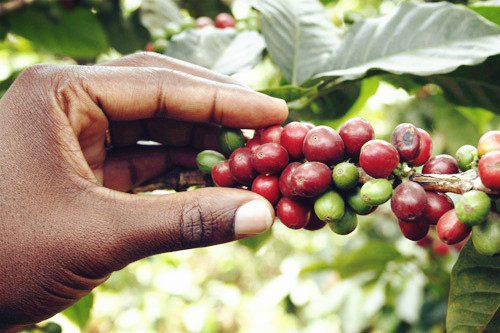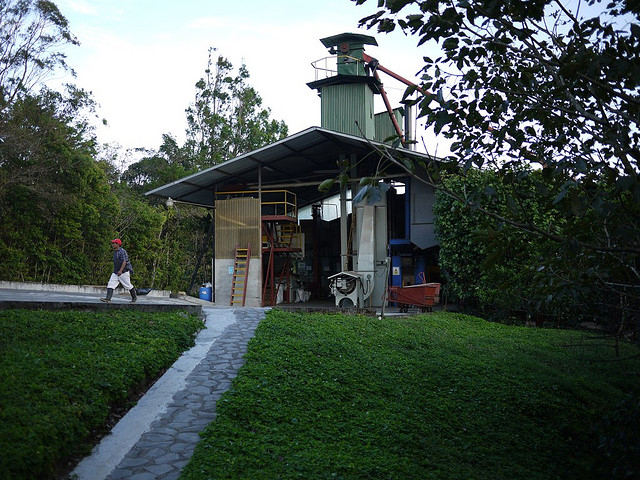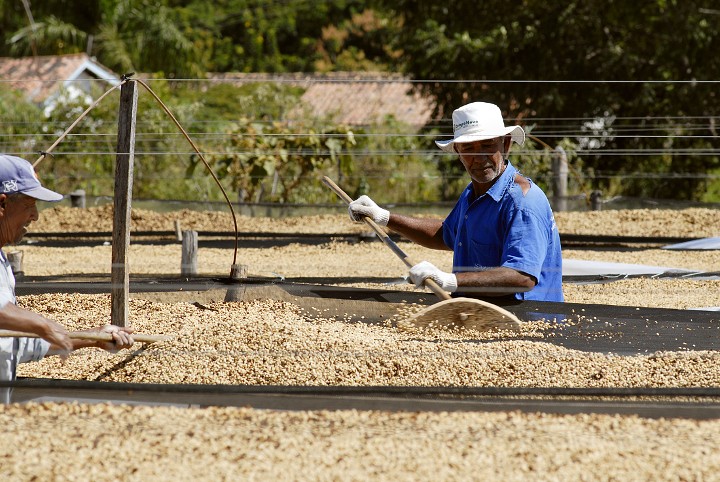Bali Garden Bean, Karana Kintamani Volcano Ubrobast, Bali, Indonesia
Although Bali coffee is a member of Indonesian coffee, coffee farmers in Bali feel that the quality of Indonesian coffee is uneven and does not match the high-quality coffee quality of Bali, so they set up their own doors and call themselves "Balinese coffee." to show the difference between Indonesian coffee and Indonesian coffee.
There are not only Arabica coffee beans in Bali, but also Robbins coffee. The protagonist of this article is Rob Coffee from Bali. This batch of Rob Coffee is one of the beans in a million, so although it comes from a low background, it is very expensive and is said to sell for as much as $50 a kilogram. Its characteristic lies in: the producing area is high altitude, the ordinary Robbst bean producing area is very low, and this batch of Bali garden beans are carefully selected at an altitude of about 500 meters. It is said that in 1 ton of beans, only about 10 kilograms of beans that meet the standard can be selected. The result after the cup test is still very amazing, I think if you think Kopi Luwak is too expensive, then try this bean is a very good suggestion, the two tastes are very similar, but after all, it is still Robaster's beans, so it is inevitable that there will be some lingering wild flavor, slightly spicy.
In the traditional culture of Bali, coffee is used as a cheap beverage raw material. The flavor and quality of the region have been unstable or depressed, and most of them have become cheap commercial beans. Rodney and his partners decided to change the local people's stereotype of coffee. They chose Wubu Market, the cultural center of Bali, and opened the only boutique cafe on the island. Rodney and two other partners themselves have also obtained the international general coffee Q certification to check the quality of their own coffee, and it is also the only local cafe with this certification. The cafe has two bean dryers from 1kg and 4kg, and all the coffee in the shop comes from high-quality raw beans from the local or nearby producing areas (for example, Java, Sulawesi, New Guinea, Florus) and so on.
The success of the cafe has given them more motivation to pursue high-quality coffee sources. a few years ago, local coffee beans in Bali were processed by farmers in the Kintamani mountainous areas. however, regardless of weather factors, berry quality, post-production environment and other factors, it is always difficult for them to master the quality of raw beans in the past year.
Since 2015, Rodney has decided to build its own processing plant next to its vestibule and cafe. When the harvest season came last year, they went to the Jintamani area at an altitude of 1400 meters to buy high-quality coffee berries, and then carried them to the stable Wubu district of Tianhou 800m for post-processing.
This year, Rodney successfully experimented with three different batches, including water washing, honey treatment, sun treatment, and three different methods. The flavor greatly exceeds the general batches of origin, and the overall defect rate and uniformity are even better than those of fine beans in Central America. Water washing and honey treatment have bright and complex acidity, and the sun treatment batches are much better than those of Panama Manor. There are more ripe peaches, pineapples, mangoes and other tropical fruits, fruit wine aromas and finish.
The concept of Karana has received a great response in Bali, but apart from coffee itself and commercial achievements, they also recognize the problems of local life, education, industry, culture, and so on, so in the process of selling coffee, they also return its profits to the children's educational institutions in the local village to contribute to the education of future children, such as building schools or purchasing educational equipment.
Country: Indonesia
Producing area: Kintamani Volcano area
Altitude: 1400 m
Harvest season: June to September every year
Treatment: insolation
Varieties: USDA, Karka, Smuri 795
Treatment plant: Wubu treatment plant
Flavor: ripe peach, pineapple, black sugar

Important Notice :
前街咖啡 FrontStreet Coffee has moved to new addredd:
FrontStreet Coffee Address: 315,Donghua East Road,GuangZhou
Tel:020 38364473
- Prev

African Coffee Sun Yega Xuefei Adodo adado Ethiopia Guido Gedeo producing area G1
Adado (Adoto) is an amazing trace producing area of Yega Xuefei. When you open the bag, the air is filled with a lot of blueberry and vanilla aroma, after baking and grinding release, the aroma will explode again, this is a veritable blueberry bomb. The first rich blueberry flavor is accompanied by a hint of well-balanced acidity, a typical sunny coffee. The cup is sweet, soft and delicate.
- Next

Half-sun treatment of coffee beans Brazilian coffee beans are treated by half-sun treatment.
As the early Brazilian coffee was all treated by traditional solarization, the overall quality of Brazilian coffee was unstable and could only wander in the middle and lower grade. In order to improve the quality of coffee in Brazil, the Brazilian government has invented the half-sun method and vigorously promoted it. At present, almost all the high-quality coffee beans in Brazil use the half-sun method to treat raw beans, which can be said to be a successful half-sun method.
Related
- Does Rose Summer choose Blue, Green or Red? Detailed explanation of Rose Summer Coffee plots and Classification in Panamanian Jade Manor
- What is the difference between the origin, producing area, processing plant, cooperative and manor of coffee beans?
- How fine does the espresso powder fit? how to grind the espresso?
- Sca coffee roasting degree color card coffee roasting degree 8 roasting color values what do you mean?
- The practice of lattes: how to make lattes at home
- Introduction to Indonesian Fine Coffee beans-- Java Coffee producing area of Indonesian Arabica Coffee
- How much will the flavor of light and medium roasted rose summer be expressed? What baking level is rose summer suitable for?
- Introduction to the characteristics of washing, sun-drying or wet-planing coffee commonly used in Mantenin, Indonesia
- Price characteristics of Arabica Coffee Bean Starbucks introduction to Manning Coffee Bean Taste producing area Variety Manor
- What is the authentic Yega flavor? What are the flavor characteristics of the really excellent Yejasuffi coffee beans?

